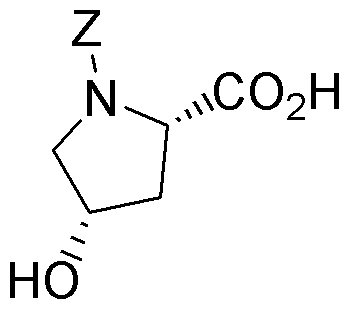Z-cis-L-4-hydroxyproline is widely utilized in research focused on:
- Pharmaceutical Development: This compound serves as a valuable building block in the synthesis of various pharmaceuticals, particularly in the creation of peptide-based drugs that target specific biological pathways.
- Cosmetic Formulations: Its unique properties make it an effective ingredient in skincare products, promoting skin hydration and elasticity, which is beneficial for anti-aging formulations.
- Biotechnology: Researchers use it in the development of biomaterials and tissue engineering applications, leveraging its ability to enhance cell adhesion and growth.
- Food Industry: As a food additive, it can improve the texture and stability of certain products, making it appealing for manufacturers looking to enhance product quality.
- Research on Collagen Synthesis: It plays a significant role in studies related to collagen production, which is crucial for understanding and treating connective tissue disorders.
Informations générales
Propriétés
Sécurité et réglementation
Applications
Z-cis-L-4-hydroxyproline is widely utilized in research focused on:
- Pharmaceutical Development: This compound serves as a valuable building block in the synthesis of various pharmaceuticals, particularly in the creation of peptide-based drugs that target specific biological pathways.
- Cosmetic Formulations: Its unique properties make it an effective ingredient in skincare products, promoting skin hydration and elasticity, which is beneficial for anti-aging formulations.
- Biotechnology: Researchers use it in the development of biomaterials and tissue engineering applications, leveraging its ability to enhance cell adhesion and growth.
- Food Industry: As a food additive, it can improve the texture and stability of certain products, making it appealing for manufacturers looking to enhance product quality.
- Research on Collagen Synthesis: It plays a significant role in studies related to collagen production, which is crucial for understanding and treating connective tissue disorders.
Documents
Fiches de données de sécurité (FDS)
La FDS fournit des informations de sécurité complètes sur la manipulation, le stockage et l’élimination du produit.
Spécifications du produit (PS)
Le PS fournit une description complète des propriétés du produit, notamment sa composition chimique, son état physique, sa pureté et les exigences de stockage. Il détaille également les plages de qualité acceptables et les applications prévues du produit.
Certificats d'analyse (COA)
Recherchez des certificats d'analyse (COA) en saisissant le numéro de lot du produit. Les numéros de lot et de lot se trouvent sur l'étiquette d'un produit, après les mots « Lot » ou « Lot de fabrication ».
Numéro de catalogue
Numéro de lot/série
Certificats d'origine (COO)
Ce certificat d'exploitation confirme le pays dans lequel le produit a été fabriqué, et détaille également les matériaux et composants utilisés et s'il est issu de sources naturelles, synthétiques ou autres sources spécifiques. Ce certificat peut être requis pour les douanes, le commerce et la conformité réglementaire.
Numéro de catalogue
Numéro de lot/série
Fiches de données de sécurité (FDS)
La FDS fournit des informations de sécurité complètes sur la manipulation, le stockage et l’élimination du produit.
DownloadSpécifications du produit (PS)
Le PS fournit une description complète des propriétés du produit, notamment sa composition chimique, son état physique, sa pureté et les exigences de stockage. Il détaille également les plages de qualité acceptables et les applications prévues du produit.
DownloadCertificats d'analyse (COA)
Recherchez des certificats d'analyse (COA) en saisissant le numéro de lot du produit. Les numéros de lot et de lot se trouvent sur l'étiquette d'un produit, après les mots « Lot » ou « Lot de fabrication ».
Numéro de catalogue
Numéro de lot/série
Certificats d'origine (COO)
Ce certificat d'exploitation confirme le pays dans lequel le produit a été fabriqué, et détaille également les matériaux et composants utilisés et s'il est issu de sources naturelles, synthétiques ou autres sources spécifiques. Ce certificat peut être requis pour les douanes, le commerce et la conformité réglementaire.


